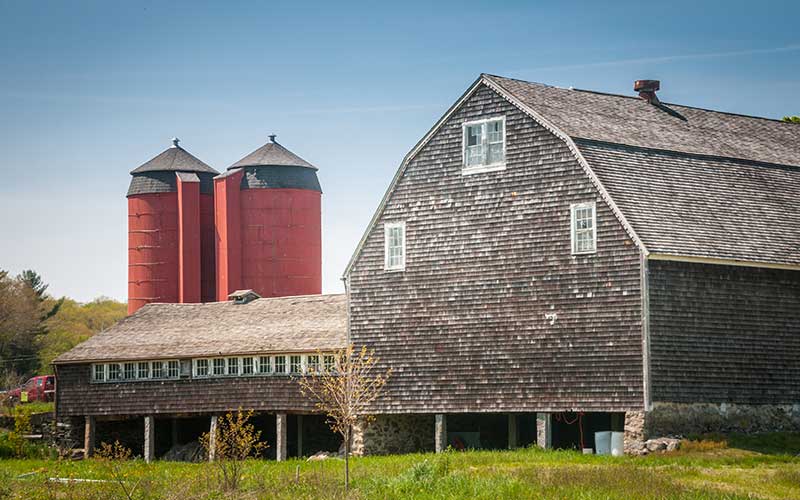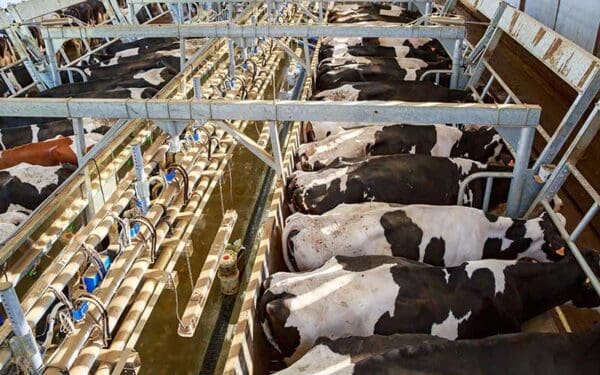
Rhode Island's food strategy focuses on the importance of supporting and growing the state's local food economy. Photo: Ken Wiedemann via IStock
Rhode Island is fortunate to have an active network of food producers, both on land and at sea (we are the Ocean State after all!). And we’re leading the way when it comes to growing our local food economy, too:
- Our little state has emerged as a national leader in the percentage of overall agricultural sales that come from farms selling directly to your local grocery store, making it easier for us all to buy fresh, local fruits and veggies from here at home rather than thousands of miles away.
- We have the great fortune of being home to food innovators – from excellent chefs and entrepreneurs making their way from Johnson & Wales University, to inventive farmers working on how to extend the growing season.
- We have a major food hub, Farm Fresh Rhode Island, which runs summer farmers markets, provides distribution services for small farms, and offers education and other programs for Rhode Islanders of all ages.
- And, in partnership with private funders, Rhode Island supports small-scale agriculture and fisheries projects through the Local Agriculture and Seafood Act (LASA) small grants program.
In May, Rhode Island took another big step toward supporting home-grown food in the state with the release of Relish Rhody, a comprehensive food strategy. The plan focuses on the importance of supporting growth in these spaces that is environmentally sustainable, supportive of the food system, and brings new jobs to our economy.
The Rhode Island Food Strategy highlights three core themes: Environment & Resiliency, Economic Development, and Health & Access. It then identifies five integrated focus areas at the intersection where these three core themes meet. We are excited to dive into these focus areas, including highlighting areas where we feel CLF’s work fits in to help move the implementation of the strategy forward.
In this post, we will dig into the focus area of “Preserve & Grow Agriculture, Fisheries Industries in Rhode Island.”
Expanding Active Farmland
One of the key issues highlighted in the strategy is the need to expand the preservation of active farmland. It comes as no surprise that farmland is a highly valued resource here in the smallest state in the country. But, like most of the U.S., we have lost a great deal of farmland to development over the past century.
To help address this pressing issue, the Rhode Island Department of Environmental Management just released the rules proposed for the Farmland Access Program, which will allow DEM to partner with the RI Agricultural Land Preservation Commission to purchase farmland, protect it, and then keep it affordable to sell it to farmers looking for land – a much-needed solution here where farmland is so expensive. We provided feedback on the program throughout the development process as we see this initiative as a great way to help keep Rhode Island farmland in farming!
Planning for the Future
Another key to preserving farmland is helping older farmers with succession planning for their operations. This is important not only for protecting precious farmland but also for ensuring that new generations of farmers are able to find land to cultivate. More successful local farms will mean we can continue to have a strong and resilient food system, which is especially important in the face of climate change.
This is an area where CLF is uniquely qualified to help – we’re using our legal expertise and collaborating with partners, including Land For Good and American Farmland Trust, to bring information to farmers on succession planning, so they can plan out the future of their farms.
Technical and Legal Guidance to Ensure Sustainable Businesses
Succession planning is just one area where farmers and food businesses need legal and technical help, however. Like any business, a farm business has distinct technical needs including small business support. Some of that happens at the local extension program (URI Extension here), as well as through the Rhode Island Commerce Corp, Division of Agriculture, the Farm Bureau, and Young Farmer Network, just to name a few! Our way of pitching in to serve this need is via the Legal Food Hub. By providing a resource for farmers to access free legal services for their transactional legal needs and trainings on relevant issues from entity formation to the Food Safety Modernization Act, we are doing our part to ensure that Rhode Island continues to have a robust food production sector.
Cultivating Innovation
The Rhode Island Food Strategy also highlights the critical area of innovation in farming. One great way that the state has supported such innovation is via the LASA small grants program. We believe in the potential of this program to infuse dollars and growth into our local food economy, as well as support our all-important food producers. CLF’s vision for this program is to see it funded with a sustainable funding stream so that innovators and inventors in our farm and food space continue to have an outlet where they may take risks for potential big rewards that the entire state will reap. If you are interested in seeing some of the projects funded by this innovative public-private partnership, you can explore the LASA Showcase booklets for the past few years: LASA 2014 here, LASA 2015 here, and LASA 2016 here.
What’s Next for the Food Strategy
To stay up to date on how Food Strategy implementation is going, follow Relish Rhody on Facebook and keep checking back with the main website: http://dem.ri.gov/relishrhody/.




